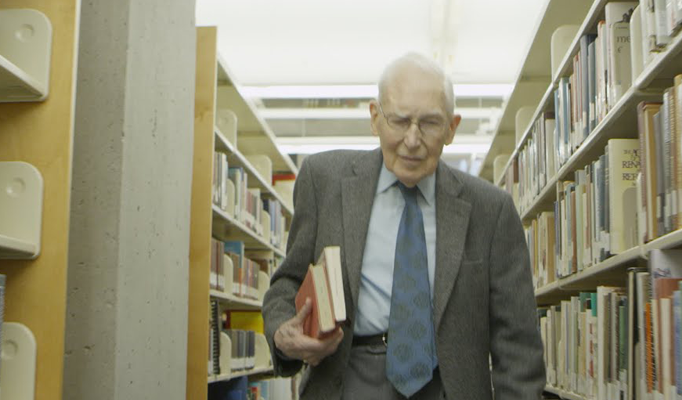
Dr. J.I. Packer wrote an unforgettable book, Knowing God, that has transformed and revived the hearts and minds of millions. Christianity Today readers named him one of the most influential theological writers of the last hundred years, second only to C.S. Lewis. He is known as a theological and spiritual giant, we call him a fire starter.
Born on July 22, 1926, Packer was raised in humble circumstances in the village of Twyning, near Gloucester, in southwest England. When chased by a schoolyard bully, he was struck by a passing bread van. This caused a serious head injury, requiring him to have brain surgery at the age of seven. The medical diagnosis was ‘a depressed compound fracture of the frontal bone on the right-hand side of his forehead.’
During his long recovery, the naturally-shy Packer read widely, typing his earliest essays. When asked in his 80s about his strongest childhood memories, he replied, “Solitariness.” He was required to wear a black aluminum plate on his head, held in place by an elastic band. At age 15, he ‘went on strike’, refusing to wear the head plate any longer.
Though raised Anglican, Packer did not know Christ personally. While attending Crypt High School, he read C.S. Lewis’ Mere Christianity and Screwtape Letters. C.S. Lewis’ two books, said Packer, ‘brought me, not indeed to faith in the full sense, but to mainstream Christian beliefs about God, man, and Jesus Christ, so that I was halfway there.’ Because of his head injury, Packer was exempted from World War II military service. He became one of the few left who attended Oxford University during that time. On October 22, 1944, while attending an Oxford Christian Union meeting (IVCF), Packer was soundly converted singing Just as I Am: “I had given my life to Christ…When I went out of the church, I knew that I was a Christian.”
Over the next few weeks of being discipled, Packer stopped viewing the Bible as just “a mixed bag of religious all-sorts, of which one could not accept more than the general outlines.” He was happy to realize that the Bible is the Word of God. Over 66 years, he has taken many courageous stands, drawing others back to the Lordship of Jesus and the authority of the Bible.
Reacting against the emotional excesses of the Keswick holiness movement, Packer turned to the historic, spiritual wisdom of the largely-forgotten Calvinist Puritans. George Whitefield (1714-1770), and the earlier John Owen (1616-1683), became significant mentors in Packer’s spiritual maturing. He even did his Oxford doctorate on Richard Baxter, who symbolized the best of the Puritans. Baxter (1615-1691) showed how to be a puritan without being puritanical in the negative sense. Packer’s Knowing God, published in 1973, is a popularization of his doctoral thesis on Baxter.
Knowing God was originally written as a series of articles for the UK-based Evangelical Magazine. Intervarsity Press UK (IVP) passed up the chance to publish it, because they wanted Packer instead to write a book about charismatic renewal. Instead, Hodder and Stoughton UK published it.
It was in North America that Knowing God would have its greatest impact, when IVP USA published it. Best-selling author, Dr. John R.W. Stott, reviewed Knowing God, saying “The truth he handles fires the heart. At least it fired mine, and compelled me to turn aside to worship and to pray.”
Dr. Alister McGrath commented that reading Knowing God “is like going on a long walk along a forest trail, rich in flora and fauna, nestling under the shadow of the great Rocky Mountains.”
Through the influence of Martyn Lloyd-Jones, Packer developed a passion for revival. In 1949, Packer and Lloyd-Jones birthed the very influential Puritan Conferences, which continued at Westminster Chapel in London until 1970. In his foreword to Lloyd-Jones’ Revival book, he said, “No concern was dearer to his heart nor to mine.” Revival was the air they breathed. He observed, “Dr. Lloyd-Jones hoped for revival until he died. He is gone. The prophets are gone, but we should still be hoping for revival. Revival is a sovereign work of God. He fixes the timetable. The schedule is His, not ours.” As a Calvinist puritan, Packer taught that we cannot produce revival through our organizational skills.
Before moving to Vancouver’s Regent College in 1979, Packer taught in several English theological settings including Oak Hill College, St. John’s Birmingham, Latimer House, Tyndale Hall, and Trinity College Bristol. As McGrath put it, Packer liked Vancouver, and he liked Canada, which seemed to him to be halfway between Britain and the United States. Regent offered Packer a much greater opportunity to write and speak at North American conferences. During his time at Regent, the student body has grown from 140 to over 800.
In 1994, Packer was the chief architect of the Anglican Essentials movement in Canada which ultimately realigned many with the revival in the Global South.
In 2000, he chaired the theological track at the World Conference on Evangelism convened by Billy Graham in Amsterdam. He also served for many years as general editor in the 2001 English Standard Version Bible.
Packer had a passion for the revival of catechism, for teaching how to live out biblical truth. Revival, said Packer, means “power, constant sustained power from God’s Holy Spirit for life and service.” Revival is about knowing God. What might it take for us to long for the fire of revival?

Leave a Reply